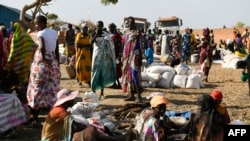The shooting deaths of two drivers with the U.N.'s World Food Program in South Sudan last week underscored the country’s status as one of the deadliest for aid workers. But aid workers say help is needed now more than ever as the World Bank estimates more than 9 million people will need assistance this year.
Since the beginning of the year, there have been close to 20 attacks on humanitarian aid workers, according to the World Food Program country director in South Sudan, Mary Ellan. She said the attacks could result in a large-scale loss of life if not stopped.
In January of this year, for example, over 300 tons of food were looted in Jonglei state. "That's enough food to feed 30,000 people for a month," she said. "These acts are deplorable because that road going to northern Jonglei and into Pibor is an artery of hope for over 1 million people who are currently food insecure."
The attack in Jonglei state that killed the two drivers led the WFP to temporarily halt food deliveries throughout the area.
Roads to areas in need of aid are often flooded and in disrepair, and aid workers say they face chronic danger from rebels, bandits and police.
Many checkpoints
Ellan described a typical trip:
"There is a proliferation of checkpoints. Our convoys spend a lot of time negotiating at these checkpoints to get past. We don't pay, but it takes time, and we lose hours delivering humanitarian cargo. Humanitarian cargo is not subject to taxes and levies."
Peter Pal leads the Rapid Response Mechanism, the WFP team that delivers food assistance to remote areas of the country. He often takes the long journey on the highways from Juba to the most remote parts of the country, gathering data, registering individuals who have been rescued and delivering food to remote regions, often with no road access.
“We were doing registration and the water levels [rose], and for us to serve everyone coming to be registered, we have to bring the services closer to the people," Pal said.
"We have to use the canoes, put the generators [in them], cross [to] the other side of the swamp and register them. This is not that easy, because we have to cross the swamp for 50 minutes on that small canoe with all your equipment." Later it began to rain, he said, and "we have to cover ourselves with a plastic sheet.”
Pal said that despite working in such a difficult environment, he gets satisfaction from serving those in need of help in some of the remotest areas.
"I think I have the courage of serving the people," he said. "I am here for a reason, because I am far better off than the suffering men and women. Let the government open humanitarian access to all areas where we serve the people. Let the government also embrace peace.”
Another aid employee, Juma, has been a humanitarian aid worker for five years. He said serving humanity is what makes him happy.
“I want to build a career where I can directly help vulnerable people due to many factors," he said. "There are incidents where other humanitarian workers have been killed while delivering aid assistance that have greatly affected me, but there is nothing that I can do and I cannot leave my work.”
Long trek in water
However, Juma - who declined to give his real name because he was not authorized to speak to the media - said the job has hard moments, too.
“The regrettable moment that I cannot forget was in 2021 in greater Jonglei," he said. "In September we walked for 15 hours barefooted in the water to access the areas, so that incident continues to disturb me when I recall about it.”
John Simon Manyuon, Jonglei state's minister of information, called attacks on aid workers were "alarming and of much concern." He said the state government was finding it hard to provide security "because we don't have enough forces and tanks to be stationed along the roads" to address civilian, humanitarian and other needs.
He urged humanitarian organizations to notify the government before sending out convoys so the state government could prepare to provide security for aid workers.




